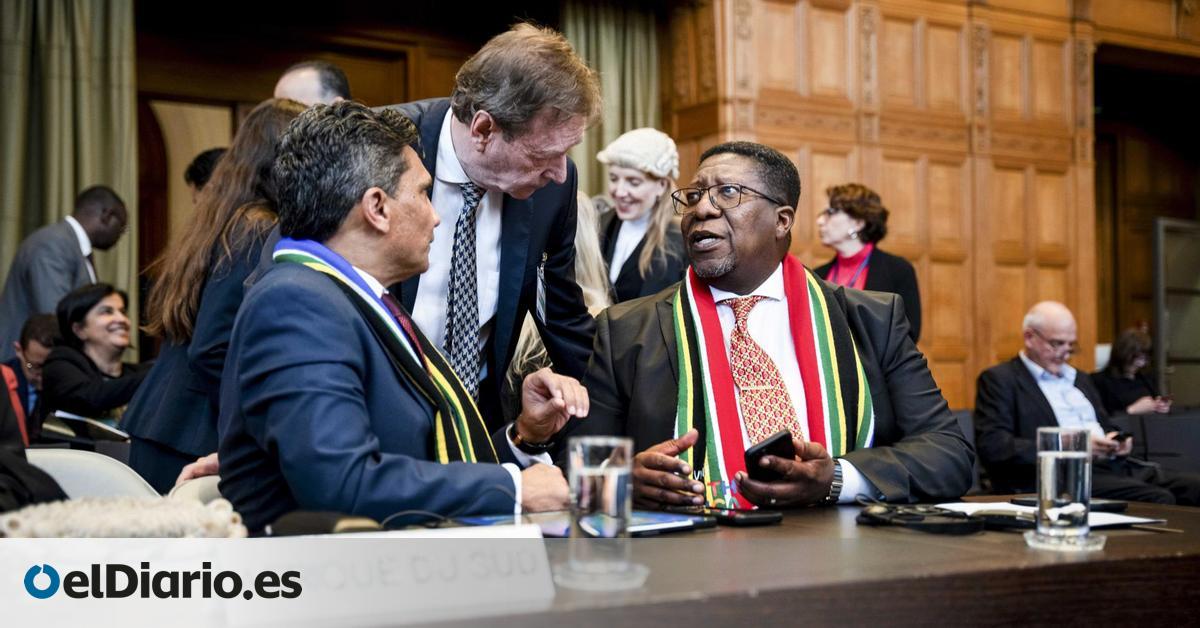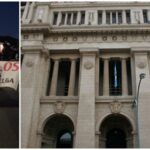
The International Court of Justice (ICJ), the highest court of the United Nations, ordered Israel this Friday to “immediately” stop its military offensive in Rafah, after South Africa requested two weeks ago that the court issue urgent precautionary measures before the Israeli attack against that town, which began on May 6 and has since caused the displacement of some 800,000 Palestinians who had taken refuge in the southern tip of Gaza.
The president of the ICJ, the Lebanese Nawaf Salam, has read and argued the decision of the judges (13 of a total of 15 voted in favor) who consider that the humanitarian situation in Gaza has degenerated in recent months and is now “disastrous.” ”, and that the measures taken by Israel in Rafah – the evacuation orders of several neighborhoods of the city and the designation of a “humanitarian zone” – are not sufficient to “reduce the risk to which the Palestinian population is exposed due to the offensive”.

Areas designated by the Israeli Army in Gaza
Extended “humanitarian zone”
“Zona humanitariana” de Al Mawasi
Areas of Rafah that Israel has ordered to evacuate
GRAPHIC: IGNACIO SÁNCHEZ. SOURCE: ISW

Areas designated by the
Israeli army in Gaza
Extended “humanitarian zone”
“Zona humanitariana” de Al Mawasi
Areas of Rafah that Israel has ordered to evacuate
GRAPHIC: IGNACIO SÁNCHEZ. SOURCE: ISW
For this reason, the court based in The Hague urges Israel to “immediately stop its military offensive and any other action in Rafah” and “keep open the land border crossings, in particular the Rafah crossing” so that humanitarian assistance can enter. and the basic services that Gazans “urgently need.” Most of the international aid (food, drinking water, fuel, medical supplies and personnel, etc.) reaches the Strip through this crossing between Gaza and Egypt, but very few trucks have been able to cross it since Israel took over. control of the Palestinian side of the border crossing on the 7th, as UN agencies have denounced.
The ICJ had already urged Israel at the end of last January to allow humanitarian aid to enter the Strip, an order that it reiterated at the end of March. He had also called on Israel to take “all measures in its power to prevent acts of genocide” in the Gaza war and to submit a report on all measures taken to implement the orders issued by the court within a period of one month. , something that has not happened to this day.
The Secretary General of the United Nations, António Guterres, reminded Israel this Friday that the ICJ orders are “binding” and said that “he trusts that the parties will duly comply with the order,” according to a statement from his spokesperson cited by the EFE Agency.
Israel turns a deaf ear to court orders
This Friday, the court in The Hague also highlighted in its decision that Israel must “guarantee unhindered access” to the Strip for any commission or fact-finding mission, or other United Nations body to “investigate allegations of genocide.” , within the framework of the lawsuit filed by South Africa last December against Israel denouncing a “pattern of conduct of genocidal intent” in its offensive in Gaza, which has left almost 36,000 dead – including more than 15,000 children – since last October 7 .
The ICJ judges themselves considered in January that there is a risk of genocide in Gaza and that Palestinians represent a group that has the right to be protected under the Genocide Convention. Furthermore, they said that the “catastrophic” humanitarian situation could worsen and, five months later, they have confirmed that this has been the case.
ICJ decisions are legally binding, but it is up to the will of countries to implement them and, in the case of Israel, it has previously shown that it has no will. Without going any further, in the case of Russia, the highest UN court asked Moscow to “immediately” suspend its military operations in Ukraine less than a month after the start of the war but, more than two years later, the Russian Army continues his offensive.
Since the ICJ’s first ruling, South Africa has asked the court to order additional precautionary measures to stop the massacre in Gaza, but Israel has again and again turned a deaf ear. During hearings held last week in The Hague, South Africa’s ambassador to the Netherlands, Vusimuzi Madonsela, asked the judges to order Israel to withdraw “totally and unconditionally” from Rafah and the border crossing of the same name. The Israeli legal team, as it has done on other occasions, assured the court that “Israel takes extraordinary measures to minimize harm to civilians in Gaza.”
The Israeli government, which generally rejects the United Nations mandate and believes that the body favors the Palestinians, has decided to participate in the ICJ process and defend itself against accusations of genocide, and after the January orders it began to allow the entry of more humanitarian aid into Gaza, but that has not been enough to prevent famine among its population. According to South Africa, “the necessary condition for the effective implementation of the court’s precautionary measures is a permanent ceasefire in Gaza”, something that Israel has so far rejected in the framework of indirect negotiations with Hamas.
The Israeli Finance Minister, Bezalel Smotrich, one of the most radical in Benjamin Netanyahu’s Government, has stated after the ICJ ruling that “those who demand that the State of Israel stop the war, demand that it be decreed that it will cease to exist.” , so they will not comply with that order. “If we lay down our weapons, the enemy will reach the beds of our children and women throughout the country,” he said through the social network X.
For its part, Netanyahu’s Office has once again rejected accusations of genocide by South Africa, calling them “false, scandalous and morally repugnant.” “Israel has not carried out and will not carry out a military campaign in Rafah that creates living conditions that lead to the destruction of the Palestinian civilian population, in part or in whole,” he said in a joint statement with the Ministry of Foreign Affairs, referring to the words used by the ICJ in its ruling. “Israel will continue its efforts to enable humanitarian assistance and will act in full compliance with the law,” he promised.
Source: www.eldiario.es

